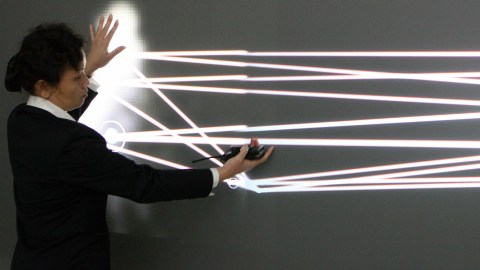How Does Intuition Work?

Humans love a good battle. Red versus blue. Religion versus spirituality. Yankees versus Red Sox. Being a champion implies someone need to finish second. Every god needs his archenemy.
One popular battle in psychology pits the logical domain of rationality against the mystical intuition. This is facilitated by comments such as ‘You’re thinking too much, you just have to feel.’ Or, from the other side, ‘Use some common sense!’
Yet as we learn more about neurochemistry the mysterious becomes understandable. This does not detract from the power of said mindset. For example, knowing that fear is processed by the amygdala is useless when you stumble into a bear while hiking. Likewise, recognizing that intuition is part of the way our brain processes information, and not an ethereal sign from ‘out there,’ does not destroy its beauty or importance in sustaining a healthy relationship to our emotions.
Psychiatrist Peter C Whybrow recognizes that intuition is a primary component in tuning your brain. He translates intuition as a reflexive self-knowledge governed by a preconscious neural network. This network is informed by previously learned patterns, which help determine moral rules, acquired habits, and beliefs. As with riding a bicycle, repetition leads to mastery—no longer restricted by uncertainty, we free up cognitive space to focus on other things. When a recognizable pattern later emerges, intuition seems to arise spontaneously.
This, of course, does not guarantee our intuition is right. We tend to point out when it happens to be on point while ignoring events in which our intuition was wrong. This is an important oversight for our emotions; we don’t like our ‘inner sense’ being off.
Accepting that intuition is unconscious pattern recognition does not sit well with those who would rather assign the phenomenon to mysticism, which is odd, given how often we enjoy the fruits of other forms of such habits. As Whybrow writes,
We find no discomfort in accepting that many motor skills and certain mental abilities—catching a ball, skiing, riding a bicycle, learning to read and write—become automatic with practice.
This inability to group intuition with such motor skills sets the stage for the imagined battle between rationality and intuition. Buddhist in name and approach, psychologist Scott Barry Kaufman thinks a middle way between those states of mind helps you live a grounded life filled with creative musings.
He points to what he calls the ‘imagination network,’ or the default mode network, commonly referred to as daydreaming. This is where intuition occurs: our subconscious pays close attention to its surroundings, piecing together parts of a narrative outside of conscious attention. When we turn our ‘executive attention’ network on by focusing in on a task or problem, we are again pulling from a lifetime of unconscious pattern recognition. The ability to both hone in on what’s in front of us and imagine a future informed by the past is what makes us unique in the animal kingdom—in many ways, this skill elevated us to the top of that kingdom. Creativity, Kaufman says, is a balanced seesaw of these two states.
Whybrow believes that this skill of quick cognitive processing is what helped human societies thrive in the first place. Citing anthropologist and evolutionary psychologist Robin Dunbar’s work, Whybrow writes,
The large human forebrain evolved not through improved nutrition, as we once thought, but in response to the competitive challenges of living in social groups.
Our ability to recognize danger in the form of a mugger or swindler is, in urban societies, as important as spotting that bear in the distance during a mountain run. Often our intuition serves us well. Yet notice the bear when it’s only ten feet away, like the robber lying in wait behind a corner, and intuition is rendered useless. Citing psychologist Daniel Kahneman, Whybrow explains:
Intuitive insight can be trusted … only when operating under experiential circumstances that are regular, predictable, and stable at the time that the reflexive insight occurs. In the absence of such stable contingencies, he says, intuition is unreliable.
Under duress the fight-flight-freeze mechanism kicks in. Prior knowledge remains important—screaming while waving your arms wildly might scare off the bear—but the ‘a ha’ moment indicative of intuition will be nowhere to be found during the rush of chemicals flooding your system.
Humans are thinkers and feelers. The imagined battle is an invention of the same mind that partakes in both. Kaufman finds arguments from either ‘side’ bogus. The feelers who state that thinkers are ‘not in touch’ with spirituality are as misguided as those who spend too much time in the executive lounge of their brain.
To illustrate this point, Kaufman argues that advanced meditators can be extremely uncreative. Spending hours upon hours a day focusing does not allow your brain time to roam freely in the spirited domain of imagination. This is a shame, he says, because ‘a ha’ moments will be harder to come by. It’s like Alan Watts used to say: don’t furrow your brow when trying to remember something. Letting go of the question in order to allow your mind space to wander is often the best way to remember something.
Intuition is not a bug, but a feature of our psychology. Yet it is part of our brain’s ability to comprehend our territory, inner and outer, not something detached ‘out there.’ The messages we receive are important, just not magical.
—
Image: Mark Ralston / Getty Images
Derek Beres is a Los-Angeles based author, music producer, and yoga/fitness instructor at Equinox Fitness. Stay in touch @derekberes.





